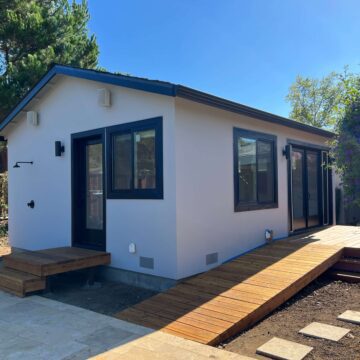Backyard homes are now even easier to build in San Jose after amending some conflicting rules.
The San Jose City Council earlier this month unanimously approved an amendment to the city’s local building code, also known as a reach code, allowing any new home under 1,200 square feet to meet energy standards if it certifies it’s an all-electric build. The amendment streamlines the energy approval process for accessory dwelling units (ADUs), also known as granny flats, which were previously held to the same standards as larger homes. Some of those standards included solar panels and extra insulation which were unrealistic for to backyard homes.
Greg Popovich, co-owner of ADU4Life, Inc., a pre-approved vendor in San Jose, said the code change was needed for a long time. Under the former code, he said an additional $10,000 to $14,000 could be tacked on to bring the property up to city standards, prices he called exorbitant.
“We’ve got a commitment to helping to put affordable housing into San Jose, and to do that, we need the cooperation of not only the people that design these things, but the people who make the rules and the laws,” he told San José Spotlight.
The amendment incentivizes ADU developers to build all-electric homes. Developers who choose to build a home with gas and electricity will have to meet additional requirements.
Julie Benabente, deputy director of the climate smart division in the city’s environmental services department, said because of that incentive, the amendment creates a synergy between the city’s climate and affordable housing goals.
“Our reach code definitely does help to streamline that process, in the sense of not making it more costly or really difficult or impossible to build ADUs in San Jose, but still meets our environmental goals,” she told San José Spotlight.
The amendment adds to an already streamlined permit process in this booming housing sector in San Jose.
The city launched its pre-approved vendors program in 2019 and since then, it has issued nearly 2,300 permits and seen 1,467 backyard homes completed, according to the ADU permit activity dashboard. In the first four months of this year, the city has issued 131 permits and seen the completion of 68 homes, according to the dashboard.
Stanley Acton, a founder of pre-approved vendor Acton ADUs, has had clients back out of projects after being hit with additional fees under the prior guidelines because he said it was difficult to come up with a winning formula for what would be accepted.
He said this code change removes that hurdle and could lead to more people building ADUs, and he anticipates it will affect the investor community first because they will get more return on their investments.
“There are people that probably chose not to do an ADU before that may come back and reevaluate that possibility for the family housing community,” he told San José Spotlight. “I think that there’s an opportunity for them to sort of get more of what they want from their dollar.”





